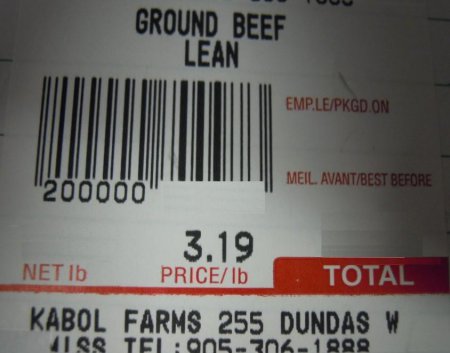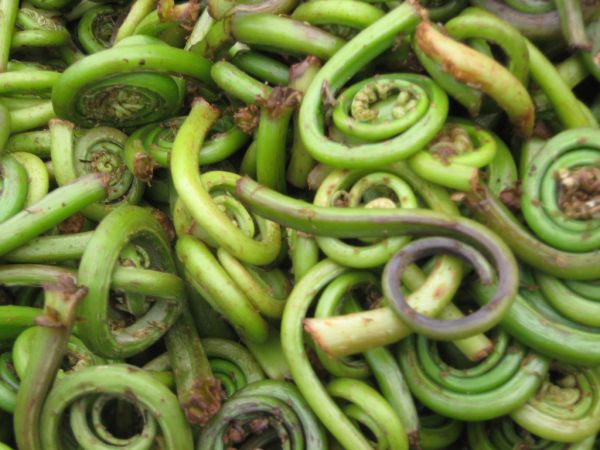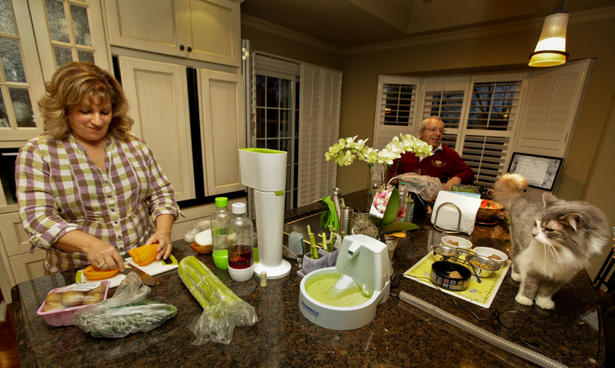It’s not that a grocery mogul told a supposed food safety conference that “one day, (farmers’ markets) are going to kill somebody;” it’s that no one in the farmer’s market community responded with any kind of microbiological food safety comment, resorting instead to, trust us and we’re inspected.
The Toronto Star reports mega-billionaire Galen-hey-now-Weston (right, exactly as shown), head of Canadian mega-grocer Loblaws, with over 1,000 stores, told the Canadian Food  Summit yesterday, "Farmers’ markets are great … One day they’re going to kill some people, though. I’m just saying that to be dramatic, though.”
Summit yesterday, "Farmers’ markets are great … One day they’re going to kill some people, though. I’m just saying that to be dramatic, though.”
Robert Chorney, the executive director of Farmers’ Markets Ontario, responded, "We strenuously object" to Weston’s remark. That was awful."
Ontario’s 175 farmers’ markets do more than $700 million in sales every year. Chorney promoted a few food safety myths of his own, saying that markets are regularly inspected and food is easily traceable because consumers know who they’re buying from.
Inspections don’t mean much. And just because someone drives to the Food Terminal in Toronto to load up on produce at 3 a.m. and then sell it at a premium at the local market adds nothing to traceability.
“The association said that four surveys since 1998 have shown that 83 per cent of respondents feel market food is as safe or safer than supermarket food.”
Surveys suck; people’s perceptions often have no basis in reality.
"A question for Galen Weston Jr: Have you ever been to a farmers’ market?" tweeted Gail Gordon Oliver, publisher and editor of Edible Toronto. "Have you ever REALLY spoken to a farmer?"
I have. And I ask questions. Like quality of irrigation water, what kind of shit soil amendments are used, and employee handwashing programs. I ask about microbial test strategies and results as .jpg) verification that the farmer, whether she bought it from the Food Terminal or grew it herself, has a clue about dangerous microorganisms. Most answer with variations of, trust me.
verification that the farmer, whether she bought it from the Food Terminal or grew it herself, has a clue about dangerous microorganisms. Most answer with variations of, trust me.
There’s already enough faith-based food safety out there.
“Some delegates whispered among themselves on coffee breaks that supermarkets sell most of the food that’s recalled by the Canadian Food Inspection Agency (CFIA).”
That’s because supermarkets sell most of the food that is consumed in Canada.
“Farmers’ Markets Ontario works with Ontario’s 36 public health units, each of which has a champion responsible for markets. It has a food safety manual on its website.”
A manual? Awesome, my faith is restored.
I don’t care if it’s a farmer’s market or the Loblaws megalomart: provide evidence that the food you’re flogging is microbiologically safe. The best producers and retailers will market food safety at retail. People want it, that’s one reason they go to markets and buy all sorts of weird categories of food, but it’s not safer; it’s hucksterism.
And being a big company like Maple Leaf of 2008 listeria-in-cold-cuts fame that killed 23 Canadians is no guarantee or even hint that microbiological food safety matters. Regardless of size, or production method, or retail experience, providers either know about microbial food safety risks and take serious steps to control those risks – or they don’t.
In the 1990s as outbreaks were increasingly associated with unpasteurized apple cider, I would ask my cider provider at the Guelph local market (that’s in Canada) what he was doing to ensure the microbiological safety of his product. He could recite a variety of measures taken on the farm, and even set up a modest micro lab on the farm for testing. I bought his cider.
.jpeg)
 weight on May 31, 2012 from the Kabul Farms store located at 255 Dundas Street West, Mississauga, Ontario. The packages bear a sticker with the product name, the store’s name and the price.
weight on May 31, 2012 from the Kabul Farms store located at 255 Dundas Street West, Mississauga, Ontario. The packages bear a sticker with the product name, the store’s name and the price.

 involved a family of four.
involved a family of four..jpeg) botulinum.Toxins produced by this bacteria may cause botulism, a life-threatening illness.
botulinum.Toxins produced by this bacteria may cause botulism, a life-threatening illness.
.jpg) It’s based on an honor system. And she hasn’t lost a dime.
It’s based on an honor system. And she hasn’t lost a dime..jpeg) 2) an outbreak of a less common species of Salmonella (S. heidelberg) across the GTA. This is under investigation by Public Health Ontario;
2) an outbreak of a less common species of Salmonella (S. heidelberg) across the GTA. This is under investigation by Public Health Ontario;.jpg) Hana, which has since reopened, also has a charge pending for sanitation issues. Chan said the infractions were serious enough to take them to court.
Hana, which has since reopened, also has a charge pending for sanitation issues. Chan said the infractions were serious enough to take them to court..jpg) consumers know who they’re buying from.
consumers know who they’re buying from..jpg)

 Summit yesterday, "Farmers’ markets are great … One day they’re going to kill some people, though. I’m just saying that to be dramatic, though.”
Summit yesterday, "Farmers’ markets are great … One day they’re going to kill some people, though. I’m just saying that to be dramatic, though.”.jpg) verification that the farmer, whether she bought it from the Food Terminal or grew it herself, has a clue about dangerous microorganisms. Most answer with variations of, trust me.
verification that the farmer, whether she bought it from the Food Terminal or grew it herself, has a clue about dangerous microorganisms. Most answer with variations of, trust me..jpeg)
 don’t get “a constant feast” (pic from Toronto Star).
don’t get “a constant feast” (pic from Toronto Star). heard of zoonoses.
heard of zoonoses.